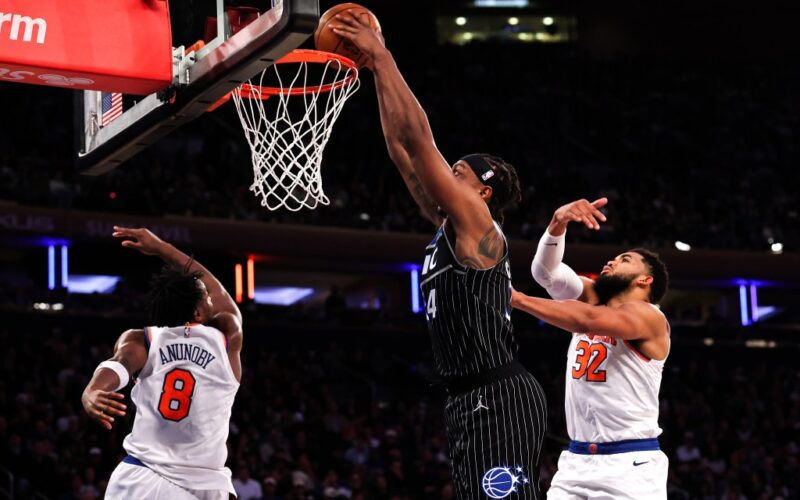Jalen Brunson declined to answer the question. The Orlando Magic answered it for him.
The Knicks entered Wednesday night riding a league-best 7-0 home record, the kind of arbitrary streak a team can either rally around or ignore completely. And historically, these Knicks have chosen the latter — no emotional swings, no victory laps, no panic buttons. Never too low, never too high.
Exactly like their leader.
So when asked whether the Knicks wanted to protect the streak — to use it as fuel, however pointless it might be given no NBA team has ever actually gone undefeated at home — Brunson didn’t bother indulging the premise.
“I don’t have to answer that,” he said.
Maybe he didn’t have to. Maybe what’s understood doesn’t need to be said. Because the Magic made the point for him. They rolled into Madison Square Garden, took the Knicks’ best home start in a decade, and shredded it without subtlety, without ceremony, without even their franchise player available after halftime.
The undefeated home streak is gone — and with it, some of the early glamour attached to a splashy coaching hire, a revamped offense and defense, and a roster fortified over the summer.
The Knicks are good. They could be very good in an Eastern Conference that’s suddenly wide open with Jayson Tatum and Tyrese Haliburton shelved.
But their flaws? They are not new. They are not subtle. And against teams like the Magic, they are not survivable.
When teams get physical with the Knicks, things have historically fallen apart.
Detroit nearly bullied New York into a first-round upset last postseason. Houston and Atlanta — two of the league’s most rugged defenses — caused issues throughout last year. And before injuries derailed them, the Magic went 3-1 against the Knicks two seasons ago, exploiting every pressure point along the way.
Orlando represents the exact archetype New York struggles with: long, athletic, disciplined, and unbothered by the Knicks’ preferred pace and spacing.
“They’re a big team. They’re athletic. They’re long. They’re well-coached,” head coach Mike Brown said pregame. “They’re a lot better than what their record says.”
The problem? Brown was right.
Yes, Wednesday’s meeting was the second leg of a back-to-back, the Knicks’ third game in four nights. But Orlando was on the same schedule burden, their back-to-back falling on Sunday and Monday.
Yet the Magic punched first, punched harder, and never let the Knicks find their composure.
Even worse: the Magic didn’t need Paolo Banchero to do it. The All-Star forward exited in the first half with a groin injury. The Magic led by 20 at the half. And despite Banchero’s absence, the Knicks didn’t cut the deficit to single digits until midway through the fourth quarter..
That’s the damning part — Banchero didn’t build the lead. Franz Wagner did.
Wagner hunted mismatches, lived at the rim, and finished the first half with 17 points en route to 24 by the early fourth. Orlando repeatedly forced cross-matches, and New York repeatedly had no counters.
When the Magic tightened the screws physically, the Knicks reverted to the worst version of themselves. The ball stopped moving. Brown’s new offense — free-flowing, read-and-react, pace-heavy — evaporated the moment the lead swelled.
Then came the isolations. The stagnant possessions. Players staring at each other as Brunson tried to rescue possessions against a set defense with length at every position.
He finished with 31 points on 10-of-23 shooting from the field — but New York was a team-worst minus-20 in his 37 minutes as Brunson was embroiled in foul trouble. He eventually fouled himself out of the game with under two minutes left in the fourth quarter after tweaking his right ankle on a drive to the rim.
Yet the most concerning performance of the night belonged to Karl-Anthony Towns. He has historically been undisciplined when it comes to personal fouls (he had five against the Magic on Wednesday) but usually the All-Star big man can take advantage of a lesser matchup.
Not on Wednesday. Despite a perceived matchup advantage vs. Wendell Carter Jr., Towns struggled to impose his will. He finished with a 15 points on 6-of-15 shooting from the field, overshadowed by Carter’s steadiness and defensive discipline. The Magic’s starting center finished with 13 points and eight rebounds on just eight shot attempts.
And while Towns publicly says the right things about patience and system fit, he still hasn’t backed the system with an all-out endorsement — and Brown’s offense has so far tilted toward wings and guards, not the self-proclaimed best shooting big man in NBA history. And when Towns did have his opportunities, he couldn’t take advantage against Carter Jr., who owns neither All-Star selections nor All-Defensive Team honors. Plus Towns nearly picked up a technical foul after Orlando’s Jonathan Isaac frustrated him with a physical deny and box-out on the low block, a sequence the All-Star big man responded to by throwing Isaac to the ground.
“I think we’re a work in progress,” Towns said after scoring 28 against Brooklyn on Tuesday. “We’re working and all of us are trying to figure out how to impact the game the most in the system.”
He’s right. The Knicks are a work in progress. Rome wasn’t built overnight. The same is true for the Knicks’ grand vision of transforming Madison Square Garden into a coliseum of championship banners.
But the Magic — with their length, their physicality, their defensive versatility, their continuity — remain one of the obstacles the Knicks have yet to solve.
The undefeated streak is gone. The forty-point quarters were absent on Wednesday, too. Those, of course, are arbitrary storylines.
The real story is that the Knicks’ Achilles heel hasn’t changed, and until they find an answer for it, their path to the NBA Finals — their first since 1999 — remains blocked by teams built exactly like the one that walked into MSG on Wednesday and gave them their first home reality check of the season.








